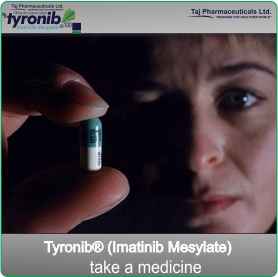Tyronib® (Imatinb Mesylate) ⇒ Brand
Tyronib® (Imatinb Mesylate), is a targeted therapy used to treat certain types of Leukaemia and soft tissue sarcoma, it may also be used to treat other types of cancers as part of research trial.
Tyronib® (Imatinib Mesylate) may be used to treat:
- Chronic myeloid leukaemia (CML)
- A type of acute lymphoblastic leukaemia (ALL) called Philadelphia chromosome positive (Ph+ ALL)
- Gastro-intestinal stromal tumours (GISTs)
- A rare type of soft tissue cancer called dermatofibrosarcoma protuberans (DFSP)
- Other types of cancers as part of a research trial.
TYRONIB ® (imatinib mesylate)
TYRONIB ® 100 mg film-coated tablets:
Each TYRONIB ® 100 film-coated tablet contains:
Imatinib (as mesylate) 100 mg Inactive ingredients:
mannitot DC 75.5 mg; crospovidone 12.5 mg;
microcrystalline cellulose 26.25 mg; talc 12.5 mg;
colloidal silicon dioxide 1.25 mg; magnesium stearate 2.5 mg;
opadry 6.25 mg
Antineoplasic agent; protein-tyrosine kinase inhibitor.
Mechanism of Action:Imatinib mesylate is a protein-tyrosine kinase inhibitor that inhibits the bcr-abl tyrosine kinase, the constitutive abnormal tyrosine kinase created by the Philadelphia chromosome abnormality in CML. Imatinib inhibits proliferation and induces apoptosis in bcr-abl positive cell lines as well as fresh leukemic cells from Philadelphia chromosome positive chronic myeloid leukemia. Imatinib inhibits colony formation in assays using ex vivo peripheral blood and bone marrow samples from CML patients.
In vivo, imatinib inhibits tumor growth of bcr-abl transfected murine myeloid cells as well as bcr-abl positive leukemia lines derived from CML patients in blast crisis.
Imatinib is also an inhibitor of the receptor tyrosine kinases for platelet-derived growth factor (PDGF) and stem cell factor (SCF), c-kit, and inhibits PDGF- and SCF-mediated cellular events. In vitro, imatinib inhibits proliferation and induces apoptosis in GIST cells, which express an activating c-kit mutation.
Store at a temperature below 30 C, inside the marketed packing.
Uses
Tyronib® (Imatinb Mesylate), is a targeted therapy used to treat certain types of Leukaemia and soft tissue sarcoma, it may also be used to treat other types of cancers as part of research trial.
Tyronib® (Imatinib Mesylate) may be used to treat:
- Chronic myeloid leukaemia (CML)
- A type of acute lymphoblastic leukaemia (ALL) called Philadelphia chromosome positive (Ph+ ALL)
- Gastro-intestinal stromal tumours (GISTs)
- A rare type of soft tissue cancer called dermatofibrosarcoma protuberans (DFSP)
- Other types of cancers as part of a research trial.
Important Safety Information
-
Pregnancy Category D:Imatinib can cause fetal harm when administered to a pregnant woman. There have been post-market reports of spontaneous abortions and infant congenital anomalies from women who have taken Imatinib.
There are no adequate and well-controlled studies with Imatinib in pregnant women. Women should be advised not to become pregnant when taking Imatinib. If this drug is used during pregnancy, or if the patient becomes pregnant while taking this drug, the patient should be apprised of the potential hazard to the fetus. - Nursing Mothers:Imatinib and its active metabolite are excreted into human milk. Based on data from three breastfeeding women taking Imatinib, the milk:plasma ratio is about 0.5 for imatinib and about 0.9 for the active metabolite.
- Pediatric Use:Imatinib safety and efficacy have been demonstrated in children with newly diagnosed Ph+ chronic phase CML and Ph+ ALL. There are no data in children under 1 year of age.
- Geriatric Use: In the CML clinical studies, approximately 20% of patients were older than 65 years. In the study of patients with newly diagnosed CML, 6% of patients were older than 65 years. No difference was observed in the safety profile in patients older than 65 years as compared to younger patients, with the exception of a higher frequency of edema. The efficacy of Imatinib was similar in older and younger patients.
_100mg_logo-header.png)


_ 100mg.png)

